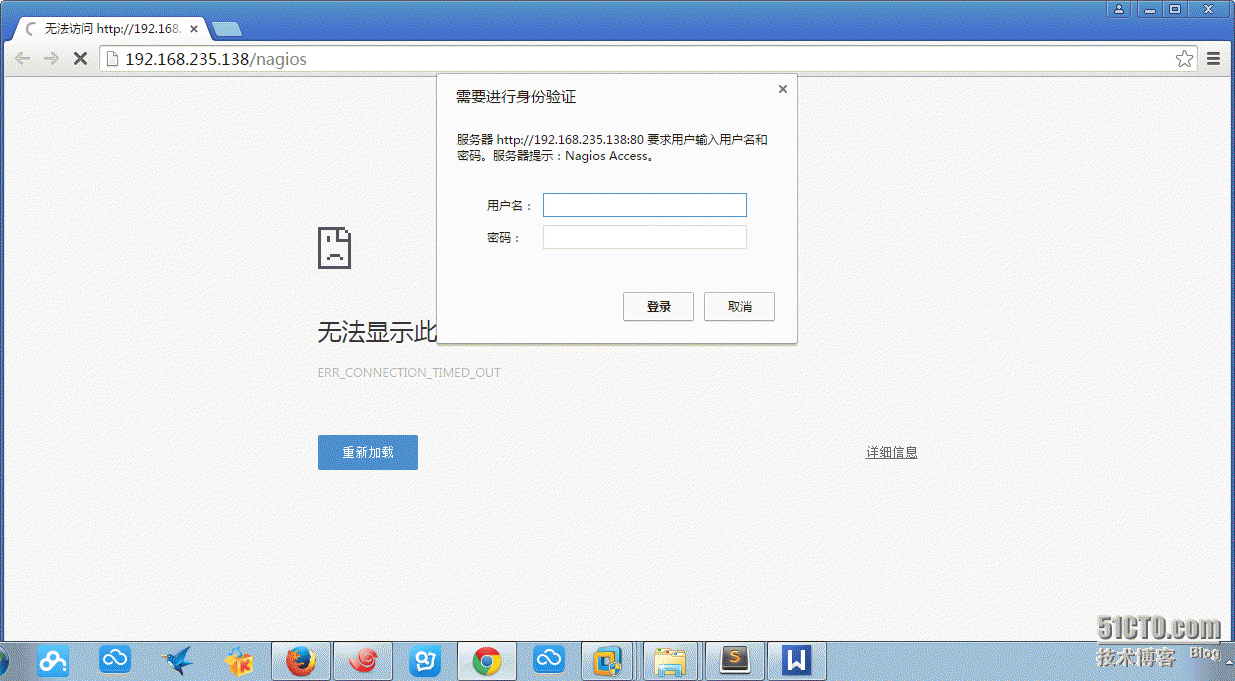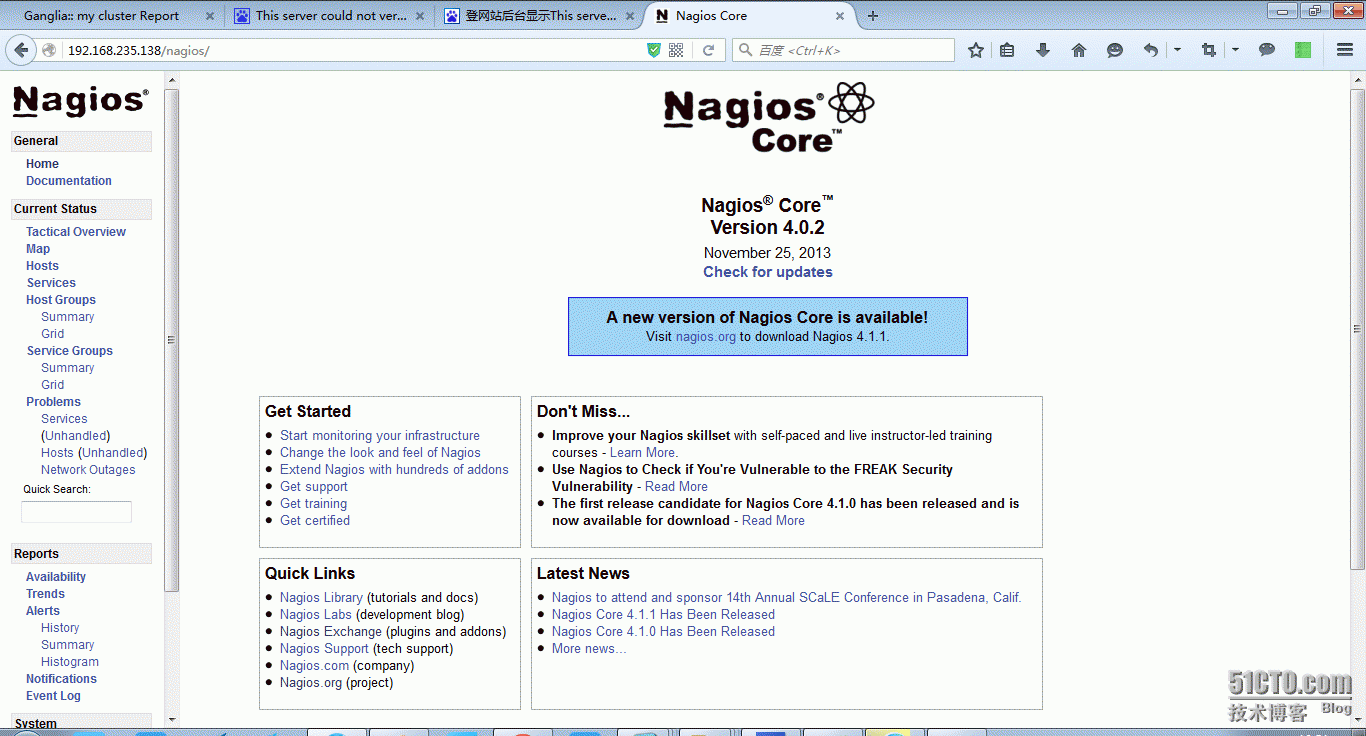如何利用python监控主机存活并邮件,短信通知
Posted
tags:
篇首语:本文由小常识网(cha138.com)小编为大家整理,主要介绍了如何利用python监控主机存活并邮件,短信通知相关的知识,希望对你有一定的参考价值。
参考技术APython(英国发音:/ˈpaɪθən/ 美国发音:/ˈpaɪθɑːn/), 是一种面向对象的解释型计算机程序设计语言,由荷兰人Guido van Rossum于1989年发明,第一个公开发行版发行于1991年。
Python是纯粹的自由软件, 源代码和解释器CPython遵循 GPL(GNU General Public License)协议[1] 。
Python语法简洁清晰,特色之一是强制用空白符(white space)作为语句缩进。
Python具有丰富和强大的库。它常被昵称为胶水语言,能够把用其他语言制作的各种模块(尤其是C/C++)很轻松地联结在一起。常见的一种应用情形是,使用Python快速生成程序的原型(有时甚至是程序的最终界面),然后对其中[2] 有特别要求的部分,用更合适的语言改写,比如3D游戏中的图形渲染模块,性能要求特别高,就可以用C/C++重写,而后封装为Python可以调用的扩展类库。需要注意的是在您使用扩展类库时可能需要考虑平台问题,某些可能不提供跨平台的实现。
nagios的安装搭建以及添加监控主机
Nagios是一款开源的免费网络监视工具,能有效监控Windows、Linux和Unix的主机状态,交换机路由器等网络设置,打印机等。在系统或服务状态异常时发出邮件或短信报警第一时间通知网站运维人员,在状态恢复后发出正常的邮件或短信通知。
前提时间需要同步
1.nagios依赖于php、http
2.查看依赖包是否已经被安装好
#rpm -q gcc glibc glibc-common gd gd-devel xinetd openssl-devel
默认的是没有gd-devel和xinetd的
# yum -y localinstall gd-devel-2.0.35-11.el6.x86_64.rpm # yum install xinetd
3.添加nagios用户组、用户
# groupadd nagcmd # useradd -G nagcmd nagios # id nagios uid=501(nagios) gid=502(nagios) 组=502(nagios),501(nagcmd) # usermod -a -G nagcmd apache
4.安装nagios和nagios-plugins
# tar xf nagios-4.0.2.tar.gz # cd nagios-4.0.2 # ./configure --prefix=/usr/local/nagios --with-command-group=nagcmd --enable-event-broker --sysconfdir=/etc/nagios # make all # make install # make install-init # make install-commandmode # make install-config # make install-webconf # htpasswd -c /etc/nagios/htpasswd.users nagiosadmin New password: Re-type new password: Adding password for user nagiosadmin # service httpd restart # chkconfig --add nagios # chkconfig nagios on # tar xf nagios-plugins-1.5.tar.gz # cd nagios-plugins-1.5 # ./configure --with-nagios-user=nagios --with-nagios-group=nagios # make && make install # service nagios start 关闭selinux,防止selinux组织脚本运行
5.登录nagios-web界面
输入用户名和密码
6.被监控端安装nagios-plugins
所需软件nagios-plugins、nrpe
# tar xf nagios-plugins-1.5.tar.gz # useradd -s /sbin/nologin nagios # cd nagios-plugins-1.5 # ./configure --with-nagios-user=nagios --with-nagios-group=nagios # make all # make install
7.被监控端安装nrpe
# tar xf nrpe-2.15.tar.gz # cd nrpe-2.15 # ./configure --with-nrpe-user=nagios --with-nrpe-group=nagios --with-nagios-user=nagios --with-nagios-group=nagios --enable-command-args --enable-ssl # make all # make install-plugin # make install-daemon # make install-daemon-config # /usr/local/nagios/bin/nrpe -c /usr/local/nagios/etc/nrpe.cfg -d //启动nrpe服务 或者 # vim /etc/init.d/nrped #!/bin/bash # chkconfig: 2345 88 12 # description: NRPE DAEMON NRPE=/usr/local/nagios/bin/nrpe NRPECONF=/usr/local/nagios/etc/nrpe.cfg case "$1" in start) echo -n "Starting NRPE daemon..." $NRPE -c $NRPECONF -d echo " done." ;; stop) echo -n "Stopping NRPE daemon..." pkill -u nagios nrpe echo " done." ;; restart) $0 stop sleep 2 $0 start ;; *) echo "Usage: $0 start|stop|restart" ;; esac exit 0 # /etc/init.d/nrped start
8.在主监控添加nrpe的定义
# ‘check_nrpe‘ command definition
define command{
command_name check_nrpe
command_line $USER1$/check_nrpe -H $HOSTADDRESS$ -c $ARG1$
}9.增加主机监控配置项
# vim /etc/nagios/objects/131.cfg
define host{
use linux-server
host_name 192.168.235.131
alias 192.168.235.131
address 192.168.235.131
}
define service{
use generic-service
host_name 192.168.235.131
service_description load
check_command check_nrpe!check_load
}
define service{
use generic-service
host_name 192.168.235.131
service_description PING
check_command check_ping!100.0,20%!200.0,50%
max_check_attempts 5
normal_check_interval 1
}
define service{
use generic-service
host_name 192.168.235.131
service_description FTP
check_command check_ftp!21
max_check_attempts 5
normal_check_interval 1
}
define service{
use generic-service
host_name 192.168.235.131
service_description SSH
check_command check_ssh
max_check_attempts 5
normal_check_interval 1
}
define service{
use generic-service
host_name 192.168.235.131
service_description HTTP
check_command check_http
max_check_attempts 5
normal_check_interval 1
}
# vim /etc/nagios/nagios.cfg
cfg_file=/etc/nagios/objects/131.cfg
# service nagios reload 重载刷新nagios-web界面可以看到添加的被监控主机 好了,此处nagios已经被安装好了,而且被监控节点也已经上线了!
本文出自 “9470860” 博客,请务必保留此出处http://9480860.blog.51cto.com/9470860/1746124
以上是关于如何利用python监控主机存活并邮件,短信通知的主要内容,如果未能解决你的问题,请参考以下文章

